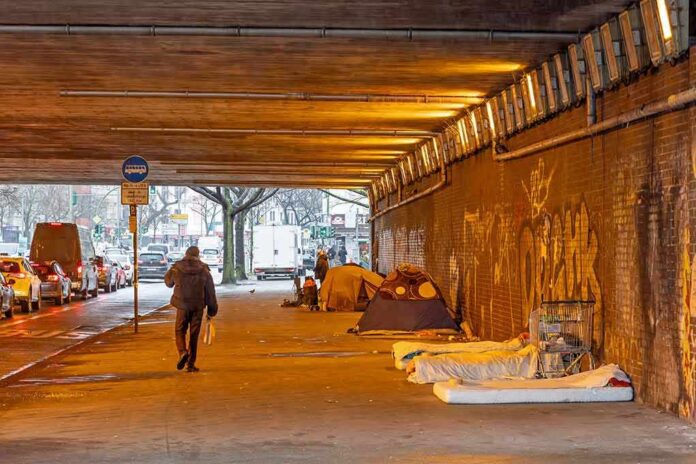Trump’s controversial plan to tackle homelessness involves relocating the homeless into camps and enforcing treatment, igniting nationwide debate.
Quick Takes
- Trump proposes shifting federal funding from housing to treatment programs.
- His plan includes banning street camping and enforcing mandatory treatment.
- Critics argue this could worsen the homelessness crisis by criminalizing the homeless.
- Supporters highlight the need to address mental health and addiction issues.
Trump’s Strategy to Address Homelessness
President-elect Donald Trump has unveiled a new approach to address the growing homelessness crisis in the U.S. His plan involves moving the homeless into large camps and mandating treatment for mental health and addiction issues. The proposal shifts focus from the current Housing First strategy, which prioritizes housing without preconditions. Trump aims to collaborate with states to enforce camping bans in urban areas and redirect federal funding from housing to addiction and mental health treatment initiatives.
This controversial plan could pave the way for the criminalization of homelessness, as critics argue it may lead to increasing punishments for those who do not comply. Several states, including Florida and Kentucky, have already adopted similar bans. Following a Supreme Court ruling permitting the punishment of outdoor sleeping, over 100 cities have enacted similar measures. Such policies have drawn criticism from various sectors, alleging they worsen the plight of the homeless by criminalizing their existence.
The Shift from Housing First
Under the new strategy, federal funding could be diverted from Housing First policies. Robert Marbut, appointed by Trump as the executive director of the U.S. Interagency Council on Homelessness, advocates for this shift. Marbut believes in prioritizing recovery and treatment services alongside housing. Despite the practical challenges, proponents of Housing First argue that it has effectively reduced homelessness when adequately executed. Evidence shows it leads to improved health outcomes and housing stability.
Marbut, the current executive director of USICH, said, “President Trump has gone days talking about [homelessness] every single day. He sees the humanitarian crisis that’s going on.”
The debate continues to divide policymakers and experts. Critics of the Housing First model acknowledge its limited success and advocate for addressing underlying issues like mental health and addiction. Nonetheless, the housing shortage remains a significant driver of homelessness, complicating the prospect of finding lasting solutions.
Criticism from Opponents
Critics, including Democratic U.S. Representative Maxine Waters, strongly oppose Trump’s proposed changes. According to Waters, the administration’s approach threatens to exacerbate the homelessness crisis nationwide. She contends that the punitive measures and funding cuts associated with Trump’s plan fail to address the root causes of homelessness, such as the lack of affordable housing and comprehensive support services.
“Make no mistake that Trump’s reckless attacks across the federal government will supercharge the housing and homelessness crisis in communities across the country,” Waters said.
While the debate continues, homelessness remains a pressing issue demanding immediate and effective solutions. Trump’s proposed policy has sparked nationwide dialogue, encouraging stakeholders to consider diverse approaches to tackle the crisis. Whether these strategies should prioritize housing or treatment remains at the forefront of the national discourse.
Sources:
- https://www.npr.org/2025/01/05/nx-s1-5230211-e1/trump-wants-to-address-homelessness-by-working-with-states-to-ban-street-camping
- https://www.kxan.com/news/trumps-homelessness-czar-looking-into-requiring-treatment-and-recovery/
- https://kffhealthnews.org/news/article/trump-homelessness-policy-housing-first-forced-treatment/











